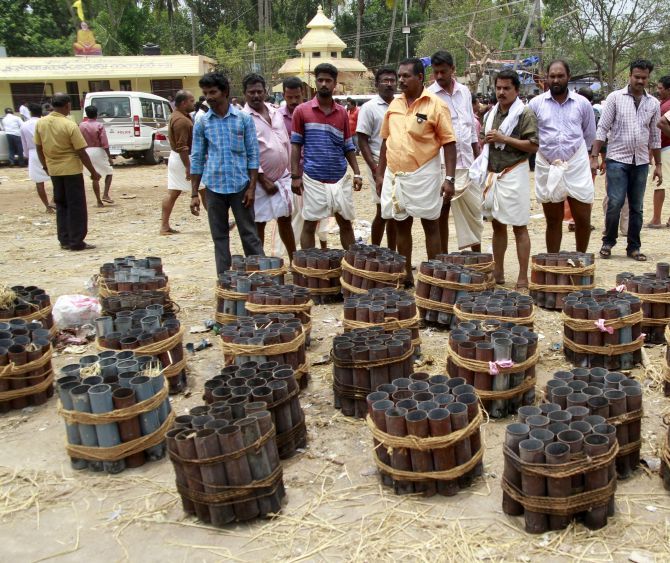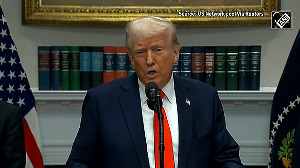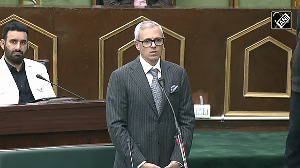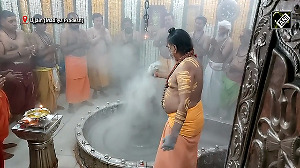'Reluctance to go against temple rituals is understandable and the Hindu vote bank is extremely important at the ensuing elections.'
'But even devout Hindus will not hold it against the government if the opportunity presented by the tragedy is utilised at least for a temporary ban.
Later, it may be too late as it might dawn on people that a hundred lives are not too much of a sacrifice to save a tradition,' says Ambassador T P Sreenivasan.

'As flies to wanton boys, are we to the gods. They kill us for their sport,' said William Shakespeare.
In the case of the pyrotechnics tragedy inside a temple compound in Paravur, Kerala, on April 10, it was devotion to the gods that killed the devotees in a huge explosion. Just like human and animal sacrifices were performed to please the gods in the past, today they pray with fire and sacrifice themselves.
Offering of noisy explosions have been a mysterious tradition in temples, particularly where Durga Devi is worshiped. Just like ringing the bell for the attention of the gods, firecrackers are used as part of the ritual, though the noise and the smoke can only disturb the peace of the temple and its vicinity.
Why they think the deity will be pleased with the ritual is not known. At a famous Devi temple, the tradition is that the firecrackers should stay outside the temple compound and the privilege of lighting them belongs to a Christian family next door.
These offerings are prevalent at Devi temples throughout Kerala. The tradition of fireworks must have grown out of this tradition, which developed into a celebratory ritual in the temples through the techniques developed by enterprising people.
Much innovation has taken place in the techniques with no research or scientific support. It has become widespread in Kerala, though there are no facilities for training of technicians. At one time, one of them managed to send a dog up in the air, imitating the launch of Laika by the Soviet scientists. The dog was, of course, smashed into smithereens.
The fireworks still consist of crude devices, often made in bamboo containers with highly explosive material, which needs to be carefully handled. Safety is left to the care of gods as they are offering to the gods, who are expected to protect the devotees.
Of late, the pyrotechnics have become more advanced and spectacular, making them ever more lethal. Occasional accidents highlight the hazards and measures are taken to restrain the operators, but enthusiasm, competition and business interests prevail and safety measures are easily abandoned.
Within days, the accidents are forgotten and people go back to their ways of gay abandon and merry making with fire, totally oblivious of the risks involved.
Looking around where the people gather in large numbers, one can see that the wonder is not that such disasters take place, but that more such tragedies do not take place.
The trampling of people that take place in temple stampedes in the north does not take place in Kerala temples, but God alone is taking care of safety. Narrow exit and entry points in temples cannot be widened and the hazard is considered part of the penance to reach God.
The reaction of the government and political parties to the Paravur tragedy may have been different, if the elections were not so close in Kerala. They saw the tragedy as an opportunity to prove their capabilities and commitment to the people.
Without realising the strain that imposes on the rescue operations, leaders, including the prime minister rushed there and competed with each other to announce largess.
Did that make a difference to the victims that images of national leaders passed by them as they were still in anguish of physical pain or agony over the dear departed?
Will such demonstrations win the politicians the vote? As of now, no one can claim victory except that the leftists were not able to join the star wars.
Like the efficient management of a cyclone that hit the US contributed to Barack Obama's second election victory, will Oommen Chandy ride on the glory of crisis management and form the next government?
In fact, the media is already all praise for the quick and efficient measures the government has taken within minutes of the tragedy. The revelation that the fireworks were not permitted by the district collector also gave the government some credit.
The air dash of the prime minister and Rahul Gandhi looked more like a distraction than help. In these days of quick communications, visits by VVIPs to assess the extent of tragedies are unnecessary and avoidable.
The hesitation on the part of the government to strike when the iron is hot by declaring an immediate moratorium on pyrotechnics till establishing an effective regime for the future is inexplicable. Reluctance to go against temple rituals is understandable and the Hindu vote bank is extremely important at the ensuing elections.
But even the devout Hindus will not hold it against the government if the opportunity presented by the tragedy is utilized at least for a temporary ban. Later, it may be too late as it might dawn on people that a hundred lives are not too much of a sacrifice to save a tradition.
The use of elephants in temples in harsh circumstances and instances of the elephants striking back have not created a public outcry. People have even resigned themselves to the fate of being possible victims of stray dogs. For a government, which has taken the brave action to close bars and created a change of thinking in the Opposition, a ban on fireworks should not be difficult.
The argument of impracticality is more applicable to liquor rather than to fireworks.
The profile of the victims show that it is the poor and the disabled that perished in the tragedy. Most of the more prosperous devotees had left after the initial display and most of the explosives had already been exhausted by the time tragedy struck.
The remaining devotees were those who may have had no choice but to stay in the temple premises till public transport became available in the morning. The affected public thus belongs to the silent majority, which has no opportunity to influence decision making.
The lobby against the ban, on the other hand, will be the businessmen, community leaders and fireworks professionals, who have a stake in the continuation of the status quo.
Voluntary restraint will not work as in the case of liquor and the government must go for a moratorium at the earliest. Such a measure will win approbation and votes for the government.
Explosion of faith is a reality in Kerala for all religions. More and more places of worship are springing up everywhere and noisy celebrations are the part of the upsurge. Here again, there is reluctance to clamp down on the noise pollution and the traffic blocks.
Bold decisions in these cases, like in the case of fireworks will be helpful to the government to return to power.
T P Sreenivasan is a former Ambassador of India and Governor for India at the IAEA; Executive Vice-Chairman, Kerala State Higher Education Council and Director General, Kerala International Centre.
IMAGE: Empty fire cracker shells at the Kollam temple a day after the horrific fire that killed 109 people and injured hundreds of others. Photograph: Sivaram V/Reuters











 © 2025
© 2025